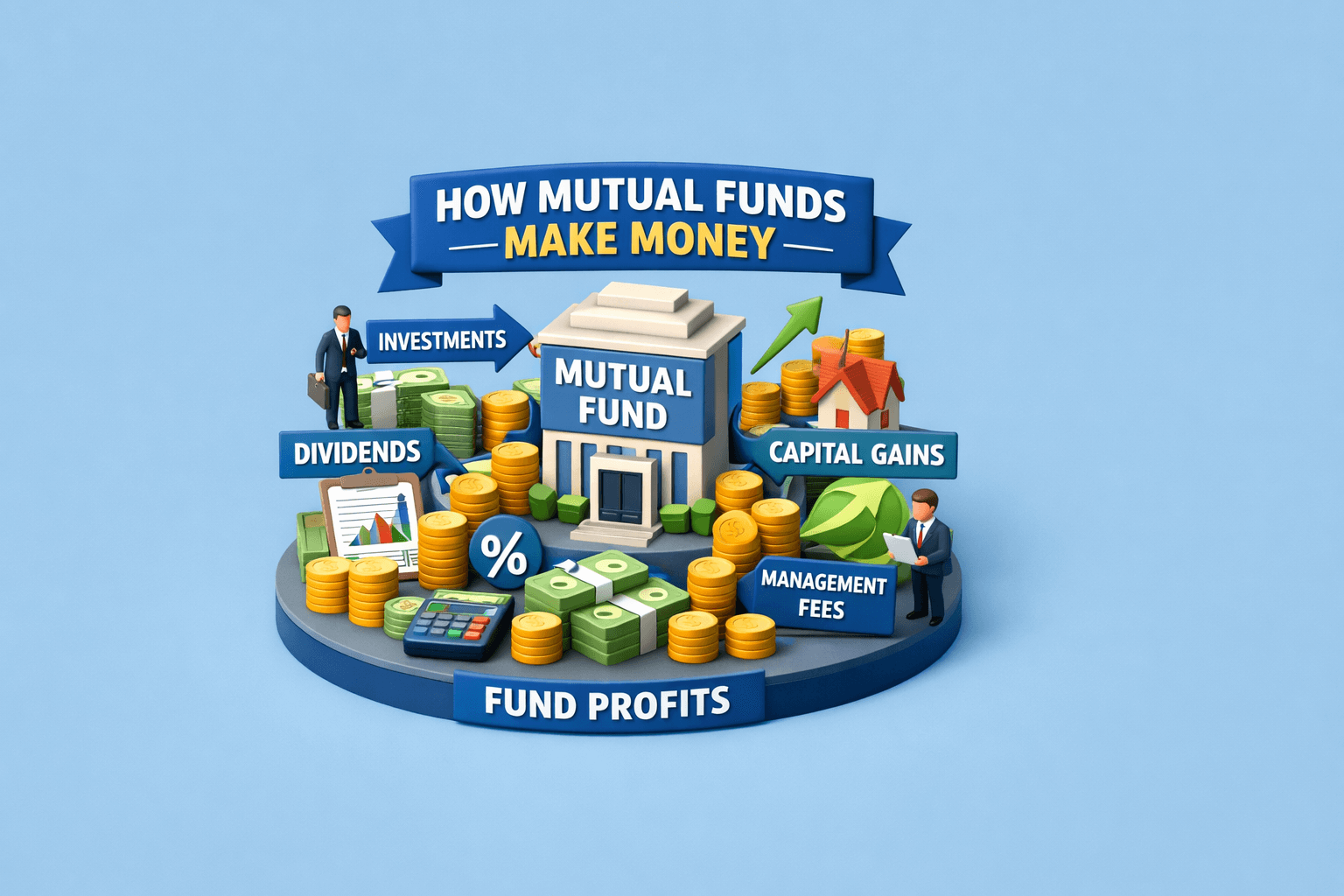- Home
- Blog
- Mutual Funds
- Best ETF to Invest in India
- Best ETF to Invest in India
Best ETF to Invest in India

- Published Date: November 11, 2024
- Updated Date: November 14, 2024
- By Team Choice
As Indian investors seek more efficient, diversified, and transparent portfolio avenues, Exchange-Traded Funds (ETFs) have become increasingly popular. These funds offer low costs, and straightforward access to diverse sectors, and are designed for both retail and institutional investors. Given the growth in India's ETF market, choosing the right funds for 2024 requires strategic insights and a focus on performance.
This article will delve into a deep analysis of top-performing ETFs in India, as suggested by a reputed expert of Choice India. Before we move forward, let’s understand the basics of ETFs:
Exchange Traded Funds (ETFs) are investment funds that pool money from multiple investors to buy a diversified portfolio of assets like stocks, bonds, or commodities. ETFs differ from mutual funds in that they trade on stock exchanges, allowing investors to purchase or sell them at any point during the trading day, just like individual stocks. This structure offers advantages such as lower costs, transparency, and flexibility, as ETFs often have lower fees and provide real-time pricing
Top 10 ETF funds in India
Here are some of the top ETF funds in India for 2024:
| ETF Schemes | Asset Size (in ₹ Cr) | 1 Year Returns (%) | 2 Years Returns (%) | 3 Years Returns (%) |
|---|---|---|---|---|
| CPSE Exchange Traded Fund | 39988.57 | 67.68 | 53.72 | 44.22 |
| Mirae Asset Nifty Next 50 ETF | 371.28 | 52.56 | 27.38 | 17.61 |
| SBI - ETF Nifty Next 50 | 2934.29 | 52.55 | 27.48 | 17.66 |
| Nippon ETF Junior BeES | 5332.08 | 52.42 | 27.4 | 17.61 |
| Nippon ETF Dividend Opportunities | 56.74 | 42 | 32.34 | 21.71 |
| Motilal MOSt Oswal Midcap 100 ETF | 533.7 | 42.01 | 34.33 | 22.25 |
| Nippon ETF Infra BeES | 159.6 | 37.81 | 27.53 | 18.18 |
| Nippon ETF Consumption | 118.9 | 33.89 | 20.55 | 17.29 |
| Kotak NV 20 ETF | 71.47 | 35.52 | 24.5 | 16.93 |
| Motilal Oswal NASDAQ 100 ETF | 8299.45 | 39.54 | 40.99 | 13.54 |
Disclaimer: The data showcased in the table is accurate as of 11/11/2024. The information presented here is subject to change and may fluctuate as market conditions and trends evolve. We suggest that you consult a financial advisor before making any further investment decisions.
Factors Considered While Choosing the Best ETF in India
Here’s a breakdown of key factors to consider, relevant to the top ETFs in India for 2024:
- Expense Ratio: The expense ratio is one of the most critical factors when choosing an ETF. With a lower expense ratio, more of your investment stays in your pocket, as less is allocated to fund management fees.
- Tracking Error: Tracking error is a measure of how closely an ETF's investment performance follows its benchmark index. Lower tracking errors mean the ETF’s performance aligns more precisely with its benchmark, enhancing reliability.
- Liquidity: ETFs with higher trading volumes tend to be more liquid, making it easier to buy and sell without significantly impacting the price. High liquidity is crucial if you need quick access to funds.
- Underlying Index Composition: Understanding the composition of the ETF’s underlying index is vital. For example, the Motilal Oswal Midcap 100 ETF is linked to the Nifty Midcap 100, providing exposure to medium-sized companies.
- Historical Performance and Returns: Reviewing an ETF’s historical performance can help you assess its consistency over time. Historical performance is also critical when considering ETFs, as it reflects potential growth among high-quality stocks.
- Risk Profile: The risk level varies based on the asset class and sector. Equity ETFs can be more volatile but potentially offer higher returns over time. On the other hand, Debt ETFs offer more stability and lower risk, which may be suitable for conservative investors.
Detailed Analysis of Top ETFs in 2024
Below, we analyse the top-performing ETFs expected to perform well in 2024, highlighting key data and insights for investors.
1. CPSE Exchange Traded Fund:
The CPSE ETF invests in a basket of government-owned (public sector) companies across sectors such as energy, mining, and financial services.
- Category: Index Funds/ETFs
- Fund House: Nippon India Mutual Fund
- NAV: ₹91.9017
- Fund Size: ₹39988.57 Cr
- Expense Ratio: 0.07%
- Risk: Very High
2. Mirae Asset Nifty Next 50 ETF:
This ETF tracks the Nifty Next 50 Index, which consists of 50 companies ranked after the Nifty 50 in terms of market capitalisation
- Category: Index Funds/ETFs
- Fund House: Mirae Asset Mutual Fund
- NAV: ₹709.2399
- Fund Size: ₹371.28 Cr
- Expense Ratio: 0.05%
- Risk: Very High
3. SBI - ETF Nifty Next 50:
Similar to the Mirae Asset ETF, the SBI Nifty Next 50 ETF also tracks the Nifty Next 50 Index.
- Category: Index Funds/ETFs
- Fund House: SBI Mutual Fund
- NAV: ₹736.376
- Fund Size: ₹2934.29 Cr
- Expense Ratio: 0.15%
- Risk: Very High
4. Nippon ETF Junior BeES:
This ETF also follows the Nifty Next 50, similar to SBI and Mirae’s offerings, but is managed by Nippon India Mutual Fund.
- Category: Index Funds/ETFs
- Fund House: Nippon India Mutual Fund
- NAV: ₹743.4157
- Fund Size: ₹5332.08 Cr
- Expense Ratio: 0.17%
- Risk: Very High
5. Nippon ETF Dividend Opportunities:
This ETF tracks companies with strong dividend-paying records, appealing to income-seeking investors.
- Category: Index Funds/ETFs
- Fund House: Nippon India Mutual Fund
- NAV: ₹83.1907
- Fund Size: ₹56.74 Cr
- Expense Ratio: 0.37%
- Risk: Very High
6. Motilal MOSt Oswal Midcap 100 ETF:
This ETF tracks the Nifty Midcap 100 Index, providing exposure to India’s mid-cap companies.
- Category: Index Funds/ETFs
- Fund House: Motilal Oswal Mutual Fund
- NAV: ₹60.2999
- Fund Size: ₹533.7 Cr
- Expense Ratio: 0.22%
- Risk: Very High
7. Nippon ETF Infra BeES:
The Nippon Infra BeES ETF invests in infrastructure-focused companies across sectors like energy, telecom, and construction.
- Category: Index Funds/ETFs
- Fund House: Motilal Oswal Mutual Fund
- NAV: ₹173.952
- Fund Size: ₹8299.45 Cr
- Expense Ratio: 0.58%
- Risk: Very High
8. Nippon ETF Consumption:
This ETF focuses on India’s consumer sector, tracking companies involved in retail, food, beverages, and more.
- Category: Index Funds/ETFs
- Fund House: Nippon India Mutual Fund
- NAV: ₹126.0511
- Fund Size: ₹118.9 Cr
- Expense Ratio: 0.31%
- Risk: Very High
9. Kotak NV 20 ETF:
The Kotak NV 20 ETF is designed to capture the performance of the Nifty 50 Index’s most liquid stocks, weighted based on free-float market capitalisation
- Category: Index Funds/ETFs
- Fund House: Kotak Mahindra Mutual Fund
- NAV: ₹156.6112
- Fund Size: ₹71.47 Cr
- Expense Ratio: 0.14%
- Risk: Very High
10. Motilal Oswal NASDAQ 100 ETF:
This international ETF follows the NASDAQ 100, giving Indian investors exposure to leading U.S. tech and consumer giants such as Apple, Amazon, and Microsoft.
- Category: Index Funds/ETFs
- Fund House: Motilal Oswal Mutual Fund
- NAV: ₹173.952
- Fund Size: ₹8299.45 Cr
- Expense Ratio: 0.58%
- Risk: Very High
Types of Exchange Traded Funds (ETFs)
- Equity ETFs: Track a stock market index and are ideal for long-term investors looking for market-linked returns.
- Debt ETFs: Grew from ₹1,497 crore in March 2017 to ₹96,163 crore by March 2024.
- Gold ETFs: Allow investors to gain exposure to gold without physically holding the metal, serving as a hedge against inflation.
- International ETFs: Invest in foreign indices, providing global exposure to markets like the S&P 500 or NASDAQ.
- Sector ETFs: Focus on specific industries, such as banking, technology, or infrastructure, making them suitable for sector-specific growth expectations.
- Smart Beta ETFs: Follow customised indices designed to outperform standard indices, often using alternative weighting schemes.
Exchange Traded Fund (ETF) Growth in India
- As of March 2024, ETFs make up 13% of India’s mutual fund industry AUM, totalling ₹6.95 lakh crore out of ₹53.40 lakh crore, a reflection of their increasing acceptance across investor segments.
- Retail folios in ETF schemes surged from ₹5.33 lakh accounts in 2017 to ₹1.25 crore by 2023, showing a strong uptick in retail investor interest and understanding of ETFs.
- ETF trading volumes grew significantly from ₹26,139 crore in FY 2016-17 to ₹1,83,676 crore in FY 2023-24, marking a 600% increase and indicating robust liquidity and market activity.
- AUM by Asset Class:
- Equity ETFs: Showcased growth from ₹43,234 crore in March 2017 to ₹5,63,176 crore by March 2024, led by indices like Nifty 50 and Nifty Next 50.
- Debt ETFs: Expanded from ₹1,497 crore in March 2017 to ₹96,163 crore in March 2024.
- Gold ETFs: Increased from ₹5,480 crore in March 2017 to ₹31,224 crore in March 2024, achieving 470% growth amid rising demand for diversification.
- Broad-based indices like Nifty 50, Nifty Next 50, and Nifty Midcap 150 dominate ETF investments in India, accounting for more than 99% of the total AUM across equity ETFs.
Should you Invest in Top ETFs in 2024?
Investing in the top ETFs in India in 2024 can be a smart choice for many investors, especially those seeking diversified exposure with lower costs and greater transparency. Here’s why you might consider ETFs this year:
Broad Market Access:
With ETFs like the Mirae Asset Nifty Next 50 ETF or Motilal Oswal NASDAQ 100 ETF, investors gain exposure to a basket of high-growth companies within an index or sector without needing to pick individual stocks.
Cost-Efficiency:
ETFs usually have lower management fees compared to actively managed mutual funds, making them more affordable for the average investor.
Flexibility and Liquidity:
Since ETFs trade like stocks, investors can buy and sell throughout the trading day, providing more control over entry and exit points.
Suitability for Passive Investors:
For those who prefer a hands-off approach, ETFs offer a simple, efficient way to follow a specific index or sector without the need for active management.
Benefits of Investing in ETFs
- Diversification: ETFs allow investors to own a diversified basket of assets with a single purchase, reducing exposure to any one stock’s performance. For example, Nippon ETF Junior BeES spreads investments across the Nifty Next 50, reducing individual stock risk.
- Lower Costs: ETFs typically have lower fees than actively managed funds due to their passive nature, benefiting cost-sensitive investors.
- Transparency: Most ETFs disclose their holdings daily, so investors know exactly what they own. This transparency helps with portfolio planning and risk management.
- Tax Efficiency: ETFs are generally more tax-efficient than mutual funds because they have fewer capital gains distributions due to their unique “in-kind” creation and redemption process.
- Liquidity and Accessibility: Since ETFs trade on exchanges, they offer high liquidity, enabling investors to access their funds quickly. They’re also easy to buy and sell, making them accessible to retail investors.
Risks of Investing in ETFs
Let’s take a look at key risks associated with ETFs and strategies to mitigate them:
1. Market Risk: Like all market-linked investments, ETFs are exposed to market volatility. If the market or sector they track declines, the ETF’s value will drop accordingly.
Mitigation: Diversify across different asset classes (e.g., equity, debt, gold) to reduce dependence on any single market.
2. Tracking Error: Tracking error arises when the ETF’s performance diverges from its underlying index. It may result from factors like fees, cash holdings, or operational inefficiencies.
Mitigation: Choose ETFs with low tracking errors, often disclosed in fund reports.
3. Liquidity Risk: Some niche or sectoral ETFs may have low trading volumes, making it difficult to buy or sell shares quickly without affecting the price.
Mitigation: Stick to ETFs with high average daily trading volumes, especially if you need frequent access to funds.
4. Sector Concentration Risk: Sector-focused ETFs concentrate investments in a single industry, making them vulnerable to sector-specific downturns.
Mitigation: Balance sector ETFs with broader, diversified ETFs or invest in multiple sectors. Diversifying across different sectors reduces the impact of a downturn in any one industry.
5. Currency Risk (for International ETFs): ETFs that track foreign assets are affected by currency fluctuations. If the rupee weakens relative to the foreign currency, returns on these ETFs may decline.
Mitigation: Monitor currency trends if investing in international ETFs or consider currency-hedged ETFs, which aim to offset currency fluctuations.
6. Interest Rate Risk (for Bond ETFs): Bond or debt ETFs are sensitive to interest rate changes. Rising rates may lead to a decline in bond prices, which can negatively impact debt ETFs.
Mitigation: If interest rate volatility is a concern, consider short-term bond ETFs, which are generally less affected by rate changes. Diversifying with equity or gold ETFs can also help balance rate-sensitive bond investments.
Future of ETFs in India
The future of ETFs in India will demand agility and innovation as diversified products, such as active, crypto, and thematic ETFs, emerge rapidly, making it essential for managers to stay ahead or risk falling behind. Differentiation will be crucial amid rising competition, calling for unique products, effective distribution, and strong investor education. ESG integration into business strategy and governance is also becoming vital, as demand for ESG-focused ETFs and custom indices grows. Additionally, as ETFs gain popularity among retail investors, heightened regulatory scrutiny is expected, especially with increasing complexities and the shift toward digital advisory platforms.
Concluding Thoughts
For investors seeking cost-efficient, diversified, and transparent investment options, ETFs offer an excellent vehicle to participate in India’s growth story and international markets. When selecting the best ETFs to invest in for 2024, consider the fund’s expense ratio, tracking accuracy, liquidity, and the sectors or indices they track. While ETFs carry certain risks, especially in sector-specific or international funds, they generally provide a balanced mix of risk and return for long-term investors.
As with any investment, conducting thorough research and assessing personal financial goals and risk tolerance is essential. If aligned with your investment strategy, ETFs can be a powerful tool for building a diversified, resilient portfolio in 2024 and beyond.
Recommended for you

How Mutual Funds Make Money

Share Market Prediction For Tomorrow

Copper Price Forecast for Next Week
